Case Victories – June 2025

We’re frequently asked how we win remands on the many cases that get referred to us. We have found that almost all ALJ decisions have errors in them. It’s pointing out those errors to OGC and the Court which procures the remand.
We are presently finding that the ALJs are not following the new regulations on supportability and consistency. If your client’s decision did not sufficiently analyze both the supportability and consistency of all the medical opinions, we want to review that case for federal court.
We’re excited to share some of our recent case victories with you. Here you can read details directly from our attorneys.
Tome v. SSA (3:24-cv-5922-DWC) | Western District of Washington
The sole issue in this case was whether the ALJ’s finding, that Plaintiff can adjust to other work existing in significant numbers, was legally erroneous due to an improper transferrable skills analysis. The Court determined that the ALJ had erred, first by finding “skills” which were not truly “skills” at all; and second by finding that such skills would transfer to work which had no indicia of similarity with Plaintiff’s past relevant work. Accordingly, remand was ordered for proper evaluation of Plaintiff’s acquired and/or transferrable work skills and the extent to which they expand her potential occupational base.
Cruz Santiago v. SSA (3:24-cv-1551-GLS) | District of Puerto Rico
Plaintiff argued that the ALJ failed to explain her evaluation of the medical opinion evidence in accordance with 20 C.F.R. § 404.1520c. Despite claiming to find opined manipulative limitations persuasive, none were included in the RFC. The ALJ went on to contradict herself by rejecting another opinion finding manipulative limitations to be inconsistent with the one she just purported to find persuasive in assessing the same manipulative limitations. These inconsistencies could not be reconciled in the absence of the requisite articulation. In addition, the ALJ further erred by impermissibly cherry-picking just two pages of the record as the basis for her findings, without addressing any of the overwhelmingly contrary evidence. The Commissioner made no attempt to argue otherwise, but instead conceded the need for remand.
Schmitz v. SSA (3:24-cv-01755-VDO) | District of Connecticut
The claimant’s treating physician opined that she could “never” be exposed to dusts in the workplace. The ALJ chose to ignore this portion of the opinion when crafting the RFC and hypothetical question. However, according to SSR 85-15, very few jobs are entirely free of dusts. Since her past work was office work, and involves at least some minimal amount of dusts, the Commissioner was forced to concede and remand the claim.
Yoder v. SSA (4:24-cv-4711) | Southern District of Texas
Plaintiff argued that the ALJ’s finding at Step 4, like the vocational testimony she relied on in reaching that finding, impermissibly conflicted with the assessed mental RFC. Specifically, Plaintiff’s semi-skilled past relevant work, with a reasoning level of three, was incompatible with the RFC for “detailed but not complex instructions.” The Court rejected the Commissioner’s attempt to liken this language to a limitation for simple “task.” As the Commissioner did not contest Plaintiff’s argument that the award and calculation of benefits was warranted, the Court remanded solely for that purpose.
 Contact Us: 1-888-WIN-SSDISM
Contact Us: 1-888-WIN-SSDISM  info@windisability.com
info@windisability.com